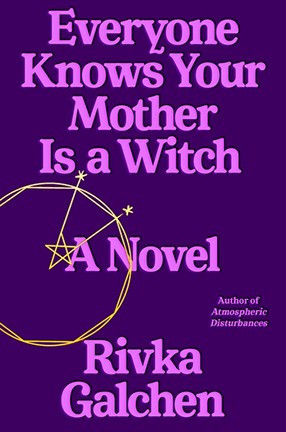Rivka Galchen Writes a Witchy New Novel
Read her book to find out what to do if your mother is accused of being a sorceress.

In 1618, in the German duchy of Württemberg, plague is spreading, The Thirty Years’ War has begun, and fear and suspicion are running rampant. In the small town of Leonberg, Katharina Kepler is accused of being a witch.
Katharina is an illiterate widow, known by neighbors for her herbal remedies and her successful children, including her eldest, Johannes, the Imperial Mathematician and renowned author of the laws of planetary motion. But he must now turn his attention from the celestial spheres to defending his mother.
Drawing on historical documents, Professor Rivka Galchen, who teaches in the School of the Arts' writing program, elaborates on this story in her second novel, Everyone Knows Your Mother Is a Witch.
Galchen talks about the novel with Columbia News, along with which other books are occupying her at the moment, her plans to become a better cyclist this summer, and who her ideal dinner guests would be.
Q. What gave you the idea for this book?
A. I was trying to learn more about the German astronomer Johannes Kepler (1571-1630), which brought me to the magnificent book, The Astronomer and the Witch, by the scholar, Ulinka Rublack. I noticed that while even reading about this 400-year-old witch trial, I was reading with a sense of suspense, as if it were possible that Johannes’s mother, Katharina, really had been a witch. That strange emotion seemed important to me, and I set aside everything else I was working on in order to follow it.

Q. The events of the past year make your new novel especially timely. Is that just a coincidence?
A. The terrifying success and power of the big lies of the past few years were, I suspect, more of an inciting emotion for the book. Though I never know why something suddenly demands all of my attention. Usually, there's a sneaky reason, undisclosed to my conscious self.
Q. What have you read lately that you would recommend, and what's on your night table to read next?
A. I have been reading a lot of scientific biography, and also a lot of mysteries. One biography that I adored was The Man Who Loved Only Numbers by Paul Hoffman. It's about the Hungarian mathematician Paul Erdos, who once said, "The game of life is to keep the SF's [Supreme Fascist, Erdos’s term for God] score low. If you do some bad things in life, the SF gets two points. If you don’t do something good that you should have done, the SF gets one point. You never score, so the SF always wins.” As for what to read next, a friend recently gifted me a bag of Nero Wolfe mysteries by Rex Stout.
Q. What are your summer plans?
A. I'm going to be in Montreal with my family, eating date pastries, and trying to become less bad at bicycling.
Q. You're hosting a dinner party. Which three academics or scholars or writers, dead or alive, would you invite, and why?
A. A dinner party! Well, I somehow only spend time with people who are good with kids being at the table, and I'm also often worried about everyone at the table liking one another, so I think I'd have Paul Erdos, Johannes Kepler, and, although she wasn't an academic or scholar, his mom, Katharina.
Check out Books to learn more about publications by Columbia professors.